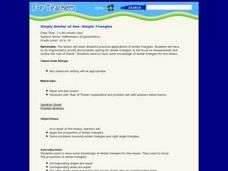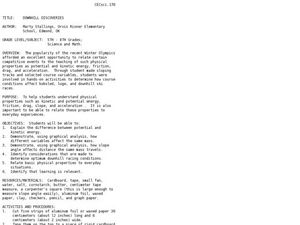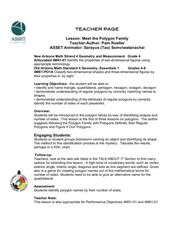Curated OER
How Cool Is Your Environment?
Students study the formulas for calculating heat energy and how to convert Celsius to Fahrenheit. They apply the formulas on a worksheet.
Curated OER
Sleuth Rays
Students conduct a close examination of the atom's electrons, and discover how to theorize the energy levels, observe the brightness of light, classify colors, and measure temperature.
Curated OER
High School Mathematics Problems from Alaska: Azimuth and Arc Length
Students track the Azimuth sunrise and sunset over time by creating a chart.
Curated OER
Wheeling Around
Eighth graders explore the characteristics of a circle and the formulas to find circumference. They use a bicycle wheel to determine the circumference around a wheel. They utilize a worksheet imbedded in this plan which has a variety of...
Curated OER
Irregular Fractals
Students study and research irregular fractals and construct a few based on their research. Students practice pattern recognition skills and plane geometry skills calculating dimensions on the Fractured Pictures activity.
Curated OER
Trigonometric Applications Outside the Classroom
Fifth graders describe and demonstrate how trigonometry can be used to find the height of a tall building or tree. They describe and demonstrate how trigonometry can be used to find the height of a high hill, or other high object where...
Curated OER
Rotations
Young scholars discuss the concepts of reflection, rotation, and translation. In this rotation activity, students investigate rotations through examples on an overhead projector. No additional worksheet or student assignment is included.
Curated OER
Pass It On
Fifth graders participate in a class activity that helps them learn some geometric terms along with their definitions. They describe relationships between two and three-dimensional shapes and analyze attributes and properties of...
Alabama Learning Exchange
Trapezoids: What's Equal or Right About Them?
Pupils explore the concept of trapezoids. In this trapezoids instructional activity, students identify legs and bases of a trapezoid. Pupils discuss the similarities and differences between isosceles trapezoids and right...
Curated OER
Simply Similar at Sea: Simple Triangles
Tenth graders answer a variety of problems based on similar triangle and learn about the rule of thumb. They will test the rule of thumb by estimating the distance to an object in the classroom.
Curated OER
Polygons All Around Us!
Students explore the concept of polygon properties. In this polygon properties lesson plan, students draw polygons with different numbers of sides such as pentagons, octagons, hexagons, etc. Students identify different geometric shapes...
Alabama Learning Exchange
Is It a Triangle?
Young scholars explore the concept of triangle inequalities. For this triangle inequality lesson, students cut spaghetti noodles into given lengths. Young scholars use the noodles to complete a worksheet about triangle...
Curated OER
Wings and Othe Things
Learners work in groups that are engaged in different activities at different times. They watch the video "Madagascar" and collect data pertaining to the Fish Eagle's arm spam. They work together to perform mathematical computations...
Curated OER
Forces Applied to an Object
Fourth graders predict, observe, and compare what happens when a force is applied to an object. In this forces instructional activity, 4th graders complete a 'swinging hammer' activity to learn about forces and motion.
Curated OER
Downhill Discoveries
Young scholars are involved in hands-on activities to determine how course conditions affect bobsled, luge, and downhill ski races.
Curated OER
Our Class Record Book
Second graders, in groups, prepare a list of proposed record ideas for the class book.
Curated OER
How much room?
Students examine the amount of usable space that exists in their classroom using square meters and square centimeters. They apply the information to predict the ideal size of a classroom.
Curated OER
Lines, Rays, Line Segments, and Planes
Students are introduced to lines, rays, line segments and planes and study the differences between them. They also practice graphing lines, rays, line segments and planes
Curated OER
Triangle Explorer
Students calculate the area of triangles using a variety of materials including computer applets.
Curated OER
Geometry: Lesson 2
Eighth graders engage in a instructional activity that is concerned with examining two dimensional figures with different properties that include circles, triangles, queadrilaterals, etc... They identify the types of figures that is...
Curated OER
Exploring Special Segments in Triangles
Young scholars discover that four special segments have a common intersection point. They identify the position of the intersection point in triangles. They produce conjectures about areas of the divided triangles.
Curated OER
Motion Capture and Analysis
Students capture the serve motion of a tennis player with a digital or video camera. Using transparencies or a software package, analyze the speed, acceleration, displacement and time of the racquet head and ball in the tennis stroke.
Curated OER
Calculating the shortest distance between two points
Eighth graders find the length of the third side of a right triangle.
Curated OER
Meet the Polygon Family
Fourth graders investigate regular polygons. In this regular polygon lesson, 4th graders explore the attributes of different polygons. Students work in groups to complete a KWL chart regarding polygons.






















